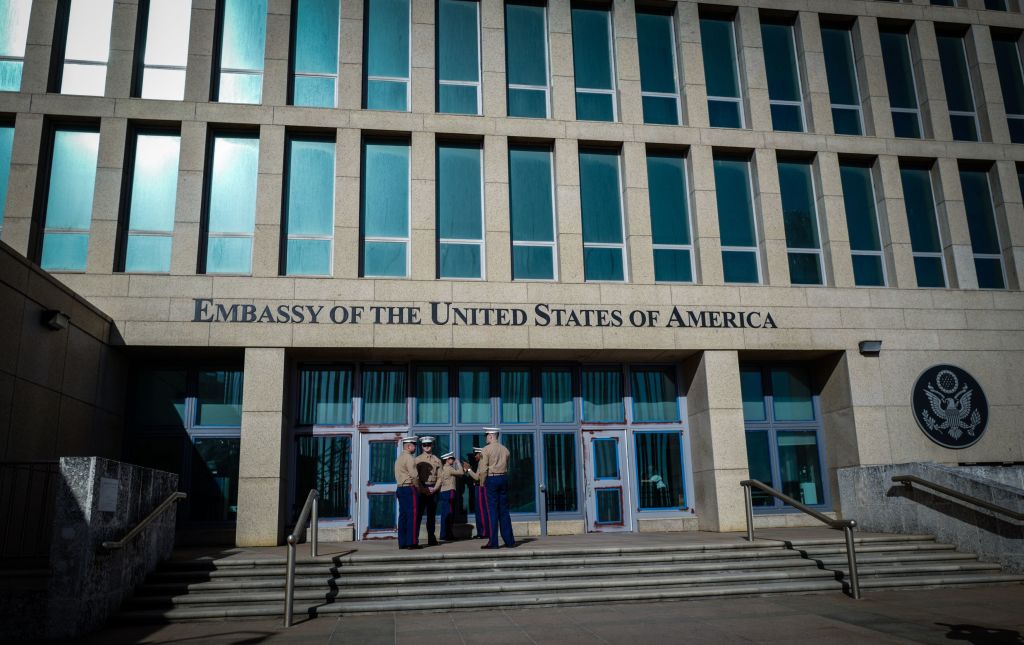Scientists say crickets may have been behind 'sonic attack' in Cuba


Diplomats stationed at the U.S. Embassy in Havana who said they suffered from headaches and nausea after hearing high-pitched sounds may have actually been subjected to the loud droning of the Indies short-tailed cricket, The Guardian reports.
In 2017, the U.S. government ordered several diplomats to leave Cuba, fearful that a sonic attack targeting them inside their homes and offices caused their illnesses. Scientists in the U.S. and U.K. now say crickets may be the culprit, as the mating call of the Caribbean species of the cricket is "about 7 kHz, and is delivered at an unusually high rate, which gives humans the sensation of a continuous sharp trill," Fernando Montealegre-Zapata, professor of sensory biology at the University of Lincoln, told The Guardian.
Scientists analyzed an audio recording of the noise released by The Associated Press. Montealegre-Zapata said males looking for mates make a similar noise, and he's "not surprised that this call could disturb people who are not familiar with insect sounds." This does not mean that a sonic attack never took place, scientists stress, and doctors are still trying to determine what exactly caused all of the diplomats to become ill.
The Week
Escape your echo chamber. Get the facts behind the news, plus analysis from multiple perspectives.

Sign up for The Week's Free Newsletters
From our morning news briefing to a weekly Good News Newsletter, get the best of The Week delivered directly to your inbox.
From our morning news briefing to a weekly Good News Newsletter, get the best of The Week delivered directly to your inbox.
A free daily email with the biggest news stories of the day – and the best features from TheWeek.com
Catherine Garcia has worked as a senior writer at The Week since 2014. Her writing and reporting have appeared in Entertainment Weekly, The New York Times, Wirecutter, NBC News and "The Book of Jezebel," among others. She's a graduate of the University of Redlands and the Columbia University Graduate School of Journalism.
-
 Film review: ‘The Choral’
Film review: ‘The Choral’Feature Ralph Fiennes plays a demanding aesthete
-
 Political cartoons for January 19
Political cartoons for January 19Cartoons Monday's political cartoons include Greenland tariffs, fighting the Fed, and more
-
 Spain’s deadly high-speed train crash
Spain’s deadly high-speed train crashThe Explainer The country experienced its worst rail accident since 2013, with the death toll of 39 ‘not yet final’
-
 Blue Origin launches Mars probes in NASA debut
Blue Origin launches Mars probes in NASA debutSpeed Read The New Glenn rocket is carrying small twin spacecraft toward Mars as part of NASA’s Escapade mission
-
 Dinosaurs were thriving before asteroid, study finds
Dinosaurs were thriving before asteroid, study findsSpeed Read The dinosaurs would not have gone extinct if not for the asteroid
-
 SpaceX breaks Starship losing streak in 10th test
SpaceX breaks Starship losing streak in 10th testspeed read The Starship rocket's test flight was largely successful, deploying eight dummy satellites during its hour in space
-
 Rabbits with 'horns' sighted across Colorado
Rabbits with 'horns' sighted across Coloradospeed read These creatures are infected with the 'mostly harmless' Shope papilloma virus
-
 Lithium shows promise in Alzheimer's study
Lithium shows promise in Alzheimer's studySpeed Read Potential new treatments could use small amounts of the common metal
-
 Scientists discover cause of massive sea star die-off
Scientists discover cause of massive sea star die-offSpeed Read A bacteria related to cholera has been found responsible for the deaths of more than 5 billion sea stars
-
 'Thriving' ecosystem found 30,000 feet undersea
'Thriving' ecosystem found 30,000 feet underseaSpeed Read Researchers discovered communities of creatures living in frigid, pitch-black waters under high pressure
-
 New York plans first nuclear plant in 36 years
New York plans first nuclear plant in 36 yearsSpeed Read The plant, to be constructed somewhere in upstate New York, will produce enough energy to power a million homes
